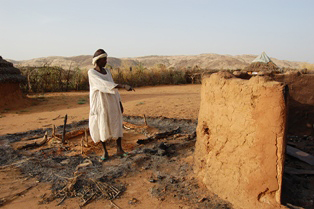"We do not, as the UN system, the NGOs do not ... and the [Sudanese] government does not have the capacity to replace all the activities that have been going on, certainly not on any short- or medium-term basis," the UN's top humanitarian official John Holmes said.
Thirteen international and three local NGOs were shut down after the International Criminal Court (ICC) issued an arrest warrant for President Omar el-Bashir on war crimes charges on 4 March.
Bashir has said Sudan would fill the gap with national agencies, but aid workers said many organisations put forward as replacements were closely allied to the government, raising issues of independence and accountability were they to act as partners for foreign aid.
"It is not a question of simply handing out food; it will not reach the most vulnerable [and] can be manipulated to target select groups or cut out those who are not favoured," one aid worker said. "There must be a system of accountability; if not, donors will soon dry up."
The expulsions, according to the UN, will leave 1.1 million people, especially in the western region of Darfur, without food, 1.5 million without healthcare and more than a million without drinking water.
Aid workers in Khartoum warned that the camps in Darfur would reach crisis point "within a few weeks, perhaps even a fortnight", unless aid work resumed. "First the water supplies will go, without the technicians to repair [them]; then there will be problems with food supplies, then healthcare," said one.
Agency "thieves"
Many Sudanese support Bashir. On 7 March, he described the expelled aid agencies as "thieves" who take "99 percent of the budget for humanitarian work themselves, giving the people of Darfur 1 percent".
|
Photo: Heba Aly/IRIN  |
| Internally displaced women in North Darfur: The expulsion of 13 international NGOs from the country will leave 1.1 million people, especially those in Darfur, without food and 1.5 million without healthcare |
"Why do the West come and want to attack Sudan?" asked Mohamed Omar, who runs a small shop in Khartoum.
They dismiss arguments that aid agencies want to support Sudanese in Darfur. "They don’t want to help us, they want to take Sudan over again," said teacher Ahmed Saddiq. "The NGOs are spies in the work of their governments and the ICC. We don’t need them, we can do this ourselves."
Sudanese media too has focused on support for Bashir, criticising the arrest warrant as a "neo-colonial" plot. "It is simply a new draconian strategy aimed at staging the scene for regime change," stated one editorial.
One of Sudan’s largest relief agencies, Sudan Social Development Organization (SUDO) – which supported some 700,000 displaced people from its 10 field offices – was also closed.
"Our work is and has always been purely humanitarian and is mostly needed at this time of our country," SUDO said in a statement. "We believe that the decision of the commissioner contradicts the Sudanese laws and violates the constitutional rights."
Camps threatened
Analysts say the move appears to be a deliberate attempt to break up the camps, dozens of which are scattered across Darfur to house the 2.7 million who have lost their homes in six years of heavy fighting.
Some of the larger camps – grim settlements with only basic services in baking heat – house up to 90,000 people. "They [the government] see them as the backers of the rebel movements," one aid worker added. "They cannot directly force people to leave, so they are doing the next best thing: making life intolerable so that people have to go."
Many parts of the camps most strongly opposed to the government allowed entry only to international relief organisations, many now expelled.
"The expulsions will hit these areas the hardest and the quickest," said a former worker in the Kalma camp in South Darfur.
Sudanese media has called for the closure of the camps. "We urge ... the concerned authorities to start seriously working out a plan to enable IDPs to return to their villages and dismantling the camps," the Sudan Vision newspaper said in an editorial on 10 March.
The majority of the 6,500 humanitarian staff in the expelled agencies are Sudanese nationals, many with years of experience in Darfur.
"I want to work again, to carry on my job, but we fear the government sees us as traitors because we worked for those they say were spies," said one Sudanese employee of an international NGO.
str/eo/mw
This article was produced by IRIN News while it was part of the United Nations Office for the Coordination of Humanitarian Affairs. Please send queries on copyright or liability to the UN. For more information: https://shop.un.org/rights-permissions





